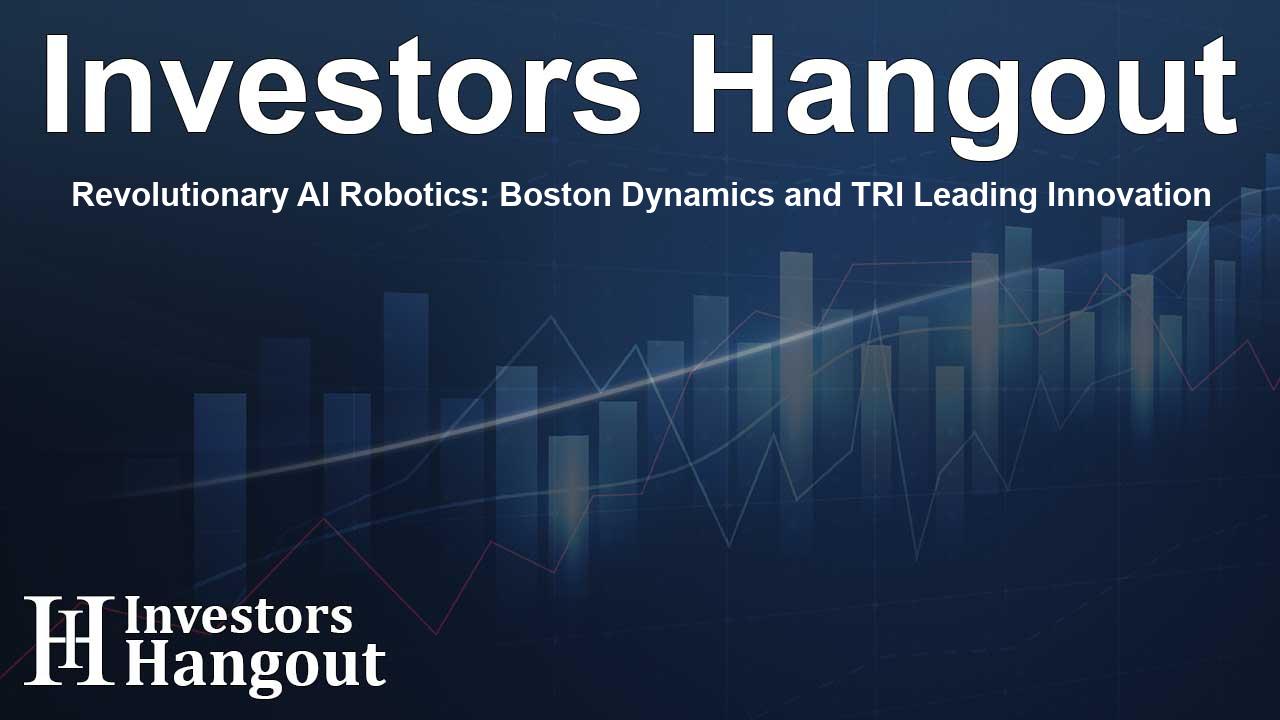Revolutionary AI Robotics: Boston Dynamics and TRI Leading Innovation

Boston Dynamics and Toyota Research Institute's Breakthrough in Robotics
Today marks an exciting milestone in the world of robotics as Boston Dynamics and the Toyota Research Institute (TRI) have revealed a significant advancement in their joint research efforts. The Atlas humanoid robot, powered by an innovative Large Behavior Model (LBM), has demonstrated impressive capabilities in autonomous whole-body manipulation and locomotion, setting a new standard in how we think about robotics.
Astonishing Capabilities of the Atlas Humanoid Robot
In a recently released video, Atlas performs a complex sequence of tasks showcasing its ability to skillfully combine object manipulation with precise locomotion. This advanced LBM allows the robot to adapt its actions effortlessly without the need for extensive programming. As a result, new functionalities can be integrated swiftly, enriching the robot's operational efficiency and capabilities.
Demonstrating Whole-Body Movement
The video illustrates Atlas engaging in a series of dynamic movements, including walking, crouching, and lifting, while effectively packing, sorting, and organizing items. Researchers have tested the robot's adaptability by introducing unforeseen physical challenges during tasks, such as closing boxes and sliding them across floors. Unlike previous humanoid robots that compartmentalized control between locomotion and manipulation, Atlas utilizes a unified LBM that treats the entire body, arms, and legs cohesively.
Collaborative Efforts Paving the Path for Future Robotics
This breakthrough stems from the collaboration initiated in late 2024 between Boston Dynamics and TRI, aimed at harnessing their combined expertise to propel the development of intelligent robots. It underscores the immense potential of artificial intelligence technologies, particularly in crafting multifunctional humanoid assistants that can seamlessly integrate into everyday environments.
Thoughts from Industry Leaders
“We aim to build general-purpose robots that can change our daily lives,” stated Scott Kuindersma, the Vice President of Robotics Research at Boston Dynamics. Training a singular neural network to handle various manipulative tasks demonstrates the ability to generalize more effectively, indicating that robots like Atlas have the capability to gather essential data for comprehensively complex tasks involving precision and dexterity.
Addressing Task Diversity with Large Behavior Models
Russ Tedrake, the Senior Vice President at TRI, emphasized the key advantage of humanoids in executing a vast array of tasks within existing environments. Previous methods of programming these tasks lacked scalability, but the introduction of Large Behavior Models has transformed this landscape. Tasks can now be taught through human demonstrations, enhancing the robots’ abilities without extensive manual coding.
The Co-Leadership of the Project
The project is co-led by Scott Kuindersma and Russ Tedrake, both of whom are exploring fundamental questions surrounding humanoid robotics and the efficacy of Large Behavior Models. Their research focuses on advancing understanding in the dynamics of whole-body control, particularly for sophisticated manipulation and responsive behaviors.
About Boston Dynamics and Toyota Research Institute
Boston Dynamics remains at the forefront of designing and deploying highly agile robots capable of addressing challenging industrial and safety tasks. The portfolio includes Spot, a quadruped known for its industrial inspection capabilities, Stretch for logistics, and Atlas, the humanoid platform in development. To learn more, visit their official webpage.
Toyota Research Institute (TRI) is dedicated to enhancing human capacity by focusing on research in various fields, including automated driving and robotics. Under the leadership of Dr. Gill Pratt, TRI is making strides in developing technology that prioritizes human safety and sustainability. Their range of initiatives points toward a future where AI and robotics can improve lives globally.
Frequently Asked Questions
What advancements did Boston Dynamics and TRI achieve with Atlas?
The partnership has demonstrated that Atlas can perform complex tasks using a unified Large Behavior Model for whole-body control, showcasing its ability to adapt to various challenges.
What is the significance of the Large Behavior Model?
The LBM allows for rapid integration of new skills without extensive programming, making robotic functionalities more flexible and efficient.
How does Atlas differ from previous humanoid robots?
Atlas utilizes a single model to control all movements cohesively, rather than separating locomotion and manipulation, enhancing its adaptability in dynamic environments.
What are the future implications of this technology?
This technology could facilitate the development of general-purpose robots that can operate seamlessly in everyday human environments and tasks.
How can companies benefit from using humanoid robots like Atlas?
Humanoid robots can efficiently tackle a wide range of tasks in existing infrastructures, leading to enhanced productivity and safety in various industries.
About The Author
Contact Riley Hayes privately here. Or send an email with ATTN: Riley Hayes as the subject to contact@investorshangout.com.
About Investors Hangout
Investors Hangout is a leading online stock forum for financial discussion and learning, offering a wide range of free tools and resources. It draws in traders of all levels, who exchange market knowledge, investigate trading tactics, and keep an eye on industry developments in real time. Featuring financial articles, stock message boards, quotes, charts, company profiles, and live news updates. Through cooperative learning and a wealth of informational resources, it helps users from novices creating their first portfolios to experts honing their techniques. Join Investors Hangout today: https://investorshangout.com/
The content of this article is based on factual, publicly available information and does not represent legal, financial, or investment advice. Investors Hangout does not offer financial advice, and the author is not a licensed financial advisor. Consult a qualified advisor before making any financial or investment decisions based on this article. This article should not be considered advice to purchase, sell, or hold any securities or other investments. If any of the material provided here is inaccurate, please contact us for corrections.
